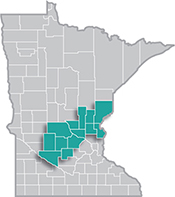 Central Minnesota is a manufacturing stronghold, with several global manufacturing firms operating there.
Central Minnesota is a manufacturing stronghold, with several global manufacturing firms operating there.
The region is especially well known for its expertise in food processing, printing, furniture manufacturing, appliances, machinery and heavy equipment manufacturing.
View our latest blogs on CareerForce. Want the freshest data delivered by email? Subscribe to our regional newsletters.
Central Minnesota's healthcare sector is experiencing significant growth
5/20/2025 11:54:03 AM
Luke Greiner
Central Minnesota's healthcare sector is experiencing significant growth, offering a wide array of employment opportunities across various roles, wage levels and educational requirements. This expansion is driven by an aging population and an increased demand for healthcare services, making it an opportune time for individuals to pursue careers in this field. Across the many different healthcare-related occupations, there were typically just over 2,800 openings at any given time during 2024, a historically high amount.
Entry-level positions such as Home Health Aides & Personal Care Aides and Nursing Assistants are among the most in-demand roles in the region. These positions typically require minimal formal education to get hired, often just a high school diploma or equivalent, and offer starting wages around $19 per hour. While these roles provide essential services and offer flexibility, they may present challenges related to compensation and part-time hours.
For those seeking roles with higher compensation and greater responsibilities, positions like Registered Nurses (RNs) are highly sought after. RNs in Central Minnesota earn a median wage exceeding $101,000 annually and can enter the field with an associate degree and expect starting wages near $40 an hour. Advanced roles such as Nurse Practitioners and Physician Assistants require an advanced degree and have starting wage offers at roughly $61 and $53 per hour, respectively.
The Health Care industry in Central Minnesota also encompasses specialized positions like Audiologists, Cardiovascular Technologists and Clinical Laboratory Technicians. These roles demand specific educational backgrounds, ranging from doctoral to associate degrees, and offer competitive wages reflective of their specialized skills.
Overall, the healthcare landscape in Central Minnesota presents diverse career paths catering to various educational backgrounds and professional aspirations. Whether entering the workforce or seeking advancement, individuals can find rewarding opportunities that align with their goals and contribute meaningfully to community health (see Figure 1).
Contact Luke Greiner at luke.greiner@state.mn.us.
If you’d like to find out more about Health Care & Social Assistance career opportunities in Minnesota or if you are an employer looking to hire workers, contact staff at a CareerForce location near you.